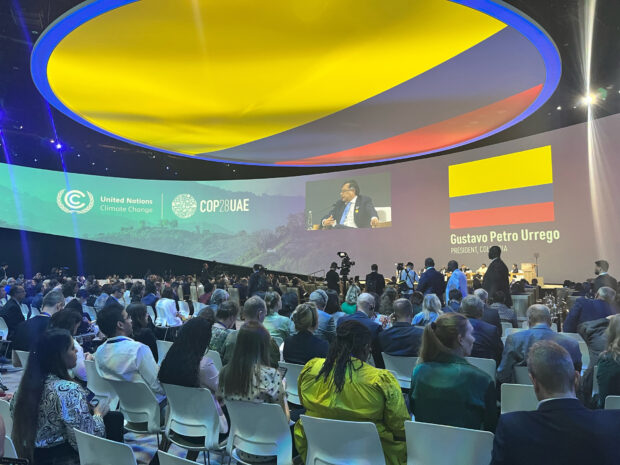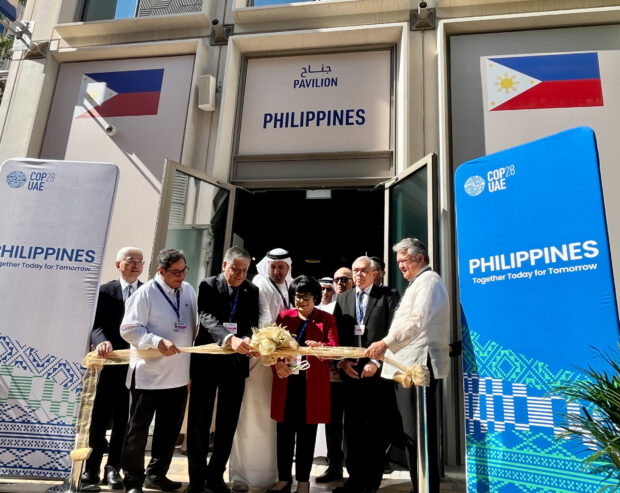Climate talks open on ‘encouraging’ note for countries like PH

‘CLIMATE SUMMIT AGENDA’ Over 70,000 delegates from more than 195 nations took part in COP28. —PHOTO BY IMELDA ABAÑO
DUBAI — The Philippines has urged wealthier nations to drive more financial resources toward climate action and support poor countries that bear the brunt of climate change, despite contributing little to it, in their transition to renewable energy.
More than 70,000 delegates from more than 195 countries kicked off the 28th Conference of Parties (COP28), the United Nations climate summit, on Thursday in this city in the oil-rich United Arab Emirates (UAE), with an agreement to hammer out the details of the “loss and damage” finance facility to help vulnerable countries deal with the immediate impact of climate change.
A major breakthrough on the first day of COP28 was the operationalization of a fund that would help compensate vulnerable countries, like the Philippines, to cope with loss and damage caused by extreme weather events — with an initial funding of more than $475 million pledged by rich countries (UAE pledged $100 million, European Union with $275 million, the United States with $17.5 million and Japan with $10 million). The World Bank will initially host the fund.
Environment Secretary Maria Antonia Yulo Loyzaga said: “It is a very encouraging development. The Philippines has been a leading voice for the vulnerable countries. The operationalization of the loss and damage fund is a very encouraging [step] that developed countries are beginning to recognize. But we are calling for the common but differentiated responsibilities and respective capacities in addressing climate change.”
On Friday she launched the first-ever Philippine pavilion at COP28, together with Special Assistant to the President Antonio Lagdameo Jr., Climate Change Commission Vice Chair and Executive Director Robert Borje, Finance Secretary Benjamin Diokno, Transportation Secretary Jaime Bautista, Science and Technology Secretary Renato Solidum Jr., Presidential Adviser on Legislative Affairs Mark Llandro Mendoza and Presidential Adviser on Investment and Economic Affairs Frederick Go.
Article continues after this advertisement‘Turning point’
Loyzaga, whom President Ferdinand Marcos Jr. named as delegation head after he canceled his trip to Dubai, said the Philippines has been instrumental in pushing for the discussion of loss and damage in the past 10 years, highlighting Supertyphoon Yolanda (international name: Haiyan) which claimed the lives of more than 6,000 people and damaged more than a million homes in 2013.
Article continues after this advertisement“In fact, our experience with Typhoon Yolanda was a turning point in bringing loss and damage to the climate summit agenda. We got to recover and we were able to withstand the impacts of climate change. We were very recognized for the loss and damage,” Loyzaga explained.

Philippine delegation led by Environment Secretary Maria Antonia Yulo Loyzaga launched the first-ever Philippine pavilion in that event to highlight the country’s experience with climate change. (Photo by IMELDA ABAÑO / Contributor)
‘Relief and rebuilding’
Lagdameo said Marcos recognized the need for countries to build climate resilience and push for low-carbon development and renewable energy investment.
“The Philippines has been [at] the forefront of climate issues. For us, it is a matter of survival, thus we seek to accelerate climate action into our Philippine Development Plan and build community resilience, climate adaptation, and mitigation. We need meaningful collaboration to tackle climate risk,” he said.
In the first two days of the climate summit, a series of speeches from world leaders signaled the urgency of addressing climate impacts. The summit is seen as a critical moment for commitments and action after richer nations failed to deliver the $100-billion annual climate funding they had promised to vulnerable countries since 2009.
One focus of COP28 remains to be the stocktake of global progress toward mitigating climate change since the Paris Agreement of 2015, which can be a leverage to accelerating climate actions and policies of countries due in 2025.
While the operationalization of the fund is a significant step toward supporting poor countries, various civil society groups said countries must also focus on addressing the root cause of the climate crisis which is fossil fuels.
“It’s too early to say [how Philippines will benefit from the loss and damage fund] as the real work on operationalization will only begin after this climate summit and it will take a year for the agreement with the World Bank to be signed,” explained Tony La Viña, former Philippine climate negotiator and now associate director for Climate Policy and International Relations of the Manila Observatory.
“Still, this means a lot for the Philippines if the fund is already operating by 2025. With many big storms hitting us every year, having a new source of funds for relief and rebuilding will be good,” he added.
‘False climate solutions’
La Viña said countries also need to see “good progression in emission reductions” and in the just transition agenda of COP28.Indigenous groups in the Philippines said they wanted to see more engagement in relevant processes in the climate negotiations, including the proposed funding mechanism of the loss and damage fund.
“We hope to see that funds can directly be given to the indigenous communities and not through the local government units or big nongovernment organizations. Much funding for climate adaptation and for biodiversity conservation uses indigenous peoples as beneficiaries but half of the funds gets consumed by these big organizations,” Global Consortium for Indigenous and Community Conserved Areas president Teodoro “Teddy” Baguilat, Jr. said, adding that all processes must have free prior and informed consent before dealing with projects in the communities.
Lia Alonzo, executive director of the Center for Environmental Concerns-Philippines, said the operationalization of the fund is an achievement after years of assertion by climate-affected communities globally.
But according to her, environmental defenders are concerned that the funds will be under the World Bank, which may drive more debt and lack of access to developing countries.
“We are concerned how the funds might be used for false climate solutions and greenwashing given previous experiences as well as human rights violations that come along with these projects,” Alonzo said.
Gerry Arances, executive director of the Center for Energy, Ecology and Development in the Philippines, said last year’s climate summit in Egypt saw great support from many parties for the inclusion of a full phaseout of fossil fuels in the final decision texts, giving as much momentum to build on for COP28 to deliver outcomes compatible to the agreed global-warming benchmark of 1.5 degrees Celsius.
“Countries like the Philippines who are most impacted by climate change must treat the climate talks as an unparalleled opportunity to demand decisions unlocking a global just transition to 100-percent renewables. This is a matter of life of death,” Arances said.